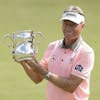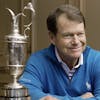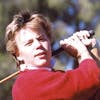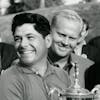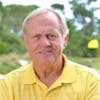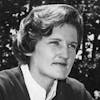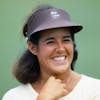Karrie Webb - Part 3 (The Final Five Majors)
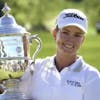
In the enthralling third installment of our four-part interview series, we welcome back Australian golf legend and World Golf Hall of Fame member, Karrie Webb. In this episode, we delve deep into the pinnacle years of her illustrious career, a journey characterized not just by victories but by unwavering tenacity and a love for the game. Karrie opens up about her final major championships, unpacking the mental fortitude, preparation, and raw emotion that went into each one.
But this isn't just a walk down memory lane; Karrie brings her unique perspective to the table as we discuss the evolution of women's golf. She candidly speaks on the challenges she's faced, both on and off the green, and her vision for the future of the sport. Offering invaluable advice for up-and-coming talents, Karrie's insights are a masterclass in dedication and sportsmanship.
This episode also offers an intimate glimpse into Karrie's relationship with fellow Hall of Famer, Annika Sörenstam. Through heartwarming anecdotes and honest reflections, we explore the dynamics of their rivalry and friendship—a narrative that serves as a microcosm for the broader world of competitive golf.
As always, we're committed to highlighting the positive aspects of the game, and Karrie's journey serves as an inspiring testament to this mission. Whether you're a seasoned golfer or new to the sport, you won't want to miss this in-depth conversation with one of golf's true icons.
Don't forget to subscribe to ensure you don't miss the final episode of this series where we will dive into Karrie's philanthropic efforts and get her take on the future of golf. Stay tuned, "FORE the Good of the Game."
Follow our show and/or leave a review/rating on:
Our Website https://www.forethegoodofthegame.com/reviews/new/
Apple Podcasts https://podcasts.apple.com/us/podcast/fore-the-good-of-the-game/id1562581853
Spotify Podcasts https://open.spotify.com/show/0XSuVGjwQg6bm78COkIhZO?si=b4c9d47ea8b24b2d
Google Podcasts https://podcasts.google.com/feed/aHR0cHM6Ly9mZWVkcy5idXp6c3Byb3V0LmNvbS8xNzM3Mjc1LnJzcw
About
"FORE the Good of the Game” is a golf podcast featuring interviews with World Golf Hall of Fame members, winners of major championships and other people of influence in and around the game of golf. Highlighting the positive aspects of the game, we aim to create and provide an engaging and timeless repository of content that listeners can enjoy now and forever. Co-hosted by PGA Tour star Bruce Devlin, our podcast focuses on telling their life stories, in their voices. Join Bruce and Mike Gonzalez “FORE the Good of the Game.”
Thanks so much for listening!
Music playing 00:00
Devlin, Bruce 00:15
After the Dinah Shore we have our second major of the year at the Merit Club were oh yes just snuck in there too by five over Meg Mallon and Christy Kerr. You remember lots about that?
Webb, Karrie 00:30
I do. I have to say that I was the worst practicer early in my career. Worst preparation, and I don't know what it was but I could never get up for it. And I but I, I felt like it was really important that it be be really good and and it really was. And so I go into a lot of these events not even though I was having a great year and not having high expectations because my prep and the lead up to it had been not great. And so that that U.S. Open at the Merit Club was one of those weeks. My preparation hadn't gone well. It didn't feel like I was swinging it that great. I started the first hole off very shaky. This hard dogleg left and I hit this block right, made a really dodgy bogey and then holed a bomb on the next hole for birdie. And that was it. I was off. Yeah. And yeah, I played great, great all week. Although it wasn't, I didn't feel like you know, walking out the last of the five shot lead. I didn't feel like that was a possibility. When I made the turn. Meg really was putting the pressure on me. And, you know, I played a very strong back nine and she had a couple of not so great holes, a couple of three putts that really left, let you know, sort of she puts you in a room. Yeah, she gave me some breathing space. And so then I could just continue to play how I was playing. And yeah, I got to the last hole and had that lead and was nice to enjoy the walk up the last.
Mike Gonzalez 02:28
Your trailed Meg by one after the first couple of rounds. And then after that third round 68 You fired you led by four. Pretty nice winners share and a nice little bonus on top for winning two majors that year.
Webb, Karrie 02:43
Yeah. All right. I had forgotten about that bonus which is funny because it was back then. 250,000 was a huge check. But yeah know, that was that was very nice. I think. I think, you know, obviously winning the U.S. Open was was the most special of all of that week was I've always held that tournament very highly. And, you know, to have won it the way I did, you know, was very special.
Mike Gonzalez 03:16
Yeah, well, this was the U.S. Open in 2000 at the Merit Club, which is up in northwest, just northwest of Chicago. And I think it was the same day Tiger won the Tiger Slam on the Old Course that same day. Yeah, pretty cool part of history, I think. Yeah, yeah. So the other thing, you know, when at the top of the show, I sort of alluded to another seven-time, major winner that we've talked to, of course, that being Juli, Inkster and a lot of interesting parallels. Although she is 14 years your senior...
Webb, Karrie 03:34
It was. Can you say that again, just in case Juli ever listens.
Mike Gonzalez 04:00
She is 14 years years senior. Yeah, she knows. She knows but you know to see and we're going to talk about some of these other wins of yours. But you you win back to back in the U.S. Open 2000 and 2001 who wins the year before Juli Inkster who wins the year after Juli Inkster you win the LPGA in 2001, who wins the two years before Juli Inkster so that old lady was doing pretty well back then, wasn't she?
Webb, Karrie 04:30
Yes, she was he was definitely you know, at the peak of powers during that time. Yeah,
Mike Gonzalez 04:36
Yeah. She was setting setting records. So you weren't done in 2000 Because during this seven win year, you continued on at the Oldsmobile classic over Meg Mallon, you won the AFLAC Champions at Robert Trent Jones Golf Trail in a playoff with Dottie Pepper. And then you went over to Japan to win the first of two straight at a tournament that I'll let you pronounce.
Devlin, Bruce 05:05
Nichriei Ladies Cup, right? Yeah,
Webb, Karrie 05:09
yeah. Nichriei World Ladies Cup yep.
Mike Gonzalez 05:12
Yeah, we talked a little bit about before, about all these stories we've heard about the Japanese bus trips. And you were saying that you might have caught the tail end of that. But you did have some fun in Korea as well.
Webb, Karrie 05:25
Yes. Yeah. You know, I think back when I first came on to, obviously that they'd had tournaments in Japan for many years. And at the end of my rookie year, they started adding a couple of events in Korea as well. And I think those events you know, although they were really important, I think they were sort of seen as bonuses to having a great year. You know, obviously, as the years progressed, and we had more tournaments in Asia, you really couldn't take a couple of events as lightly as we probably took, took those ones in Asia. But you know, if anyone's been to Korea or Japan, you can have a 15 or 20 mile bus ride that can take two hours. Sometimes it's the traffic's really bad. And so, you know, I definitely had lots of fun bus trips in Japan, but my first couple of years playing in Korea, you know, we had, especially on the Sunday, at the end of my rookie, that's probably the most memorable one. We, it was it was the Samsung world lady. So there was only I think 16 or 20 of us in the field. And all but I think sorry, pack were LPGA members. So there was one or two buses that you could take to go back to the hotel and, you know, along with the caddies, so we were told before we left the clubhouse on the Sunday that that the traffic was really bad heading back into Seoul. The caddies loaded loaded up the bus with I don't know, three crates of beer. I think beverages. Yeah. And we, we had a karaoke machine on the bus and music playing and yeah, it was four hours took us back. I think it was 20 miles or 25 miles we had to go.
Mike Gonzalez 07:36
Well, that's at least that's at least a three beer drive.
Webb, Karrie 07:39
Yeah, last was going so slow. And that we went into this little town and we were running out of beer. We had enough time. That is just a more No, no, the bus never thought that was going the caddies jumped off, ran and bought some more beer and a few of us with a bus what went through the bathroom and we could walk to catch up to the bus. But yeah, so yeah, very, very memorable. You know, I, I love those trips, because we all had to stay in the same hotel. And, you know, you got to know players that you didn't necessarily hang out with on a regular basis. And, and because I think we took them a little bit more casually than than in a regular event. Everyone was having a good time. And it was it was a lot of fun. So I think it was sort of tailing off around the time I came on tour because it's heard many more stories, more yet better stories than the one I just told you. And that was that was the PG version that I've heard a lot of those and I was glad I was a part of it. Because I remember a few years later in Japan, it was it was always common that for the bus ride home and carry a couple of beers onto the bus in Japan and I knew things were changing when one year in Japan, I don't know what year it was, but I maybe 2004 or five when we started having more parents on tour and I remember getting on the bus at the end of the day with a big totally be to our half hour 45 minute bus ride back and the looks I got from half the bus on my way back to sit in the back. I was like, yeah, things have definitely changed. It's not not the way it used to be.
Mike Gonzalez 09:43
We've heard so many great stories. I've mentioned a couple of them to yesterday but you know, and the hidden talents of these of these ladies right I mean Kathy Whitworth who knew she was the dancer that we heard she was and and we heard of singers and chorus Amy Alcott she well she played golf well, they didn't want her to sing or dance. So I suppose you could have put your tap dancing and guitar playing skills to work.
Devlin, Bruce 10:12
kept them up.
Webb, Karrie 10:13
Yeah. Actually, even after a few drinks, everyone wants me to tap dance and I refuse. I retired those tap shoes.
Mike Gonzalez 10:23
Honestly, I would have thought that tap dancing skills would have allowed you to avoid that fall before the Q school. But that's a whole another thing
Webb, Karrie 10:29
thing? Well, yeah, you would have hoped so.
Mike Gonzalez 10:32
So we finish up 2000 Great, great years, as you mentioned, maybe 10 wins worldwide with the Player of the Year again on the LPGA. Tour, money leader, Vare Trophy winner. And you're able to carry a torch that year? I understand.
Webb, Karrie 10:49
Yeah, that's probably what will be the greatest honor I've been given due to my golfing career was to to be a part of the Olympics in 2000, and Sydney. And, you know, I, I had asked if I, you know, because I was gonna come home and watch some of the, you know, go to the opening ceremony and watch some of the the Olympic events. And so I had asked if, if I could carry the torch around the time of the opening ceremony. But I got given one of the most incredible honors to carry the torch the last leg of the night before the opening ceremony and to carry it up the steps of Sydney, town hall and live like the cauldron where the flame stayed overnight. So it was it was an amazing experience that, you know, they said there was a million people lining the streets of Sydney for the run that night. It was Everyone was super excited to have the Olympics back in Australia. And yeah, it was, it was amazing. Everyone was so into it.
Mike Gonzalez 11:57
So how long was your little leg that you had to run?
Webb, Karrie 12:01
I don't I don't remember, I think it was only like two or 300 meters, maybe 400 meters. It wasn't it wasn't super long. I just remember so Dawn Fraser. For those of you who aren't Australian, or swimming fans, she was one of our greatest ever swimmers and one of the greatest ambassadors to female sport. Since she retired from swimming. She's an icon in Australia, she was the one to have the the flame off to me. And she had walked her leg and just soaking up the whole atmosphere. And and I was quite aware at the time that a lot of people didn't consider golf as athletes. So I was I was determined that I'll ever run a run. Yeah, I was determined I was running. But friends of mine that were watching it on TV were like, they were yelling at the TV telling me to slow down, you know, because I then had a ton of adrenaline because of how loud the crowd was. And yeah, yeah, it was a big thrill.
Mike Gonzalez 13:09
And you know, you cap off that year with a with a great, great honor like that. You mentioned on Fraser I think you won the Dawn Fraser award that year as well didn't you?
Webb, Karrie 13:20
Yes, I did. Which I I knew how great a year I had. But you know, I really thought Cathy Freeman who had won the the gold medal for the 400 meters that year at the Olympics was a shoo in for it. So I was at the awards just thinking that we were going to cheer Cathy Freeman for winning and I was completely shocked to have won it.
Mike Gonzalez 13:44
I think 10 wins, two majors is right up there.
Webb, Karrie 13:48
Yeah,
Devlin, Bruce 13:49
yep. I would say so.
Mike Gonzalez 13:50
Let's go on to 2001 Bruce another good year.
Devlin, Bruce 13:53
Oh boy. What you keep just barely winning these U.S. Open championships this time you only won by eight I mean, come on Karrie. Se Ri Pak was second. This was at Pine Needles Lodge and Golf Club in North Carolina. Pretty Pretty nice. scored a win by eight over Se Ri Pak for your second U.S. Open in a row by the way.
Webb, Karrie 14:21
Yes. Well, Pine Needles was actually where I played my first ever U.S. Open in 1996. And Annika won that year to go back to back in U.S. Opens as well. So for me Pine Needles was the U.S. Open. That was my introduction to U.S. Open golf and it was the first course that I you know, I was going back to having had played there so I you know already knew what I was getting. I already knew I loved the Golf Course and how it played. And, you know, I'd had a pretty decent year till then I hadn't won but I've been playing really quite well. And and I'm going off the story that I said in 99, where I didn't practice very well, it was the one, one of the one times that my preparation was great. The only time that my practice was poor was on a Wednesday, but I think it was just because I felt so ready, and I was just ready to go. And you know, I'd sort of switched off on the preparation because I knew I was ready. And it's probably the best. I've played a major from round one to round four in my entire career, so you just, you know, everything fired, you know, that the only the only time that there was a little nerve on Sunday was was on the second hole, I made a, Sarah made a birdie and I made a maybe an eight to 10 footer for a bogey. And, you know, things out of if they hadn't gotten in, you know, the day would have definitely been a lot closer. That sort of, even though it was for Bo yet it settled, man. I just went to work after that. And, you know, it was five shots, but I voted the last two holes, and I think Se Ri bogeyed 17 So I think I only went to 17 with a two shot lead or maybe a three shot lead. And, you know, it wasn't until I made birdie on 17 that I knew that I was going to have a nice walk down 18 Yeah,
Mike Gonzalez 16:40
yeah. Rounds of 70, 65, 69, 69, minus seven. And so that second round 65 Got you a little bit of cushion. You had a three shot lead after the second round, but that third round 69 had you in front by five after after 54 holes. It was the largest margin of victory in 21 years in that tournament allowed you to go back to back and there was a young girl that competed, of course we see her on TV nowadays took over for Judy Rankin, but 13 year old Morgan Pressel competed that U.S. Open.
Webb, Karrie 17:14
Yes, she did. I remember thinking, you know, how is any 13 year old ready to play in the U.S. Open. But Morgan started a trend for sure. You know, after her there was, as many young girls qualify for the U.S. Open, but I think she she showed young girls that it was possible.
Mike Gonzalez 17:34
Where there weren't many of you, on the men's or the women's side that have gone back to back in the U.S. Open? How hard is that pressure wise?
Webb, Karrie 17:43
I think for me, it was. I mean, obviously, there was pressure there. But I think because we were going back to Pine Needles, and I loved Pine Needles, and I played at 96. And the fact that, you know, I had played a U.S. Open there, I knew what I was getting before I got there. So I can mentally prepare for all the shots prior to getting there, which you don't normally get to do U.S. Open venue that you haven't played at. So you know, I think that took a little bit of the pressure off, took pressure off of the preparation because I think you knew how the course was already going to play. You sort of had an idea where they put pins. So that that helped. Definitely but I think winning one U.S. Open is difficult and winning to whether it's back to back as you know, even that much harder.
Mike Gonzalez 18:38
Well, let's go ahead and win an LPGA Championship too Bruce, whatdo you think?
Devlin, Bruce 18:41
That's right, then become the youngest winner of the Career Grand Slam that year. The 2001 LPGA Championship at DuPont Country Club in Delaware.
Webb, Karrie 18:52
Yeah, that was a up and down week for me emotionally. Obviously, I just wanted us open. My parents were over. And I had a love hate relationship with DuPont because we played there every year for maybe my first six or seven years on tour. Yeah. And I either played well there or I played poorly. And it was no there was no middle ground. And so you know, I think the confidence I had from the U.S. Open I started the week off really well. And having my parents so it was really special. But halfway through the tournament. My grandfather my my mom's dad had a massive stroke. And so first they had they didn't tell me about it and then because they thought he might pull through but then by Saturday afternoon My parents had got word from a show delay that mom needed to get home to, to have any chance of seeing granddad before he passed. So, and these, these are the grandparents that, you know, got me, put me out when I was four years old. Yeah. So. So that night I remember Saturday night, sitting in the stairwell. Again, I had a bit of a lead to going into that, to that last round. And sitting in the emergency exit stairwell at the hotel. And, you know, they I booked them on flights to get out on a Sunday, you know, because, you know, flight to Australia at nighttime, so they couldn't get out to the Sunday night but meant that they, they weren't there to watch on the on the Sunday, but Sunday, Saturday night, I was contemplating that plane the next day and going home with them. And, you know, my dad taught me understanding and playing. And I don't, I really don't have a lot of memory of of that round. I think my caddie Mikey navigated me around the course and was really, my, my, my brain for the day. Because I had taken my parents that morning, I hadn't gotten much sleep, and I've taken my parents to the airport prior to teeing off. You know, my thoughts weren't really, at the Golf Course that day, there was my grandfather and my mom, so and my, obviously my grandma grandmother at home, so yeah, so it was, it was a happy, sad, you know, obviously, achieved a career feat. But, you know, my grandfather was passing away at the same time.
Mike Gonzalez 21:47
Yeah. And, you know, that's something that our listeners sometimes don't appreciate. But they're constantly reminded as we interview, everybody, everybody that outside of the ropes life continues to go on. Yeah.
Webb, Karrie 22:01
Yeah. That's, that's for sure. My, my parents tried to shield me from a lot of that stuff. And I get so frustrated with them. Because, you know, it's like, you know, I don't want to find out days later, you know, I mean, they had to tell me, they had to tell me when though over with me, because, you know, my mom was aware and she was upset. So, you know, but if I would have been if they'd have been in Australia, I bet I wouldn't have found out until the tournament ended, which would have upset me as well.
Mike Gonzalez 22:31
You know, it's not easy being a parent. You know, sometimes there's just no right right answers. You know, either way you go. It's pros and cons. But that must have been a tough thing to play through. You mentioned, DuPont and you would have liked looking back on that stretch to have love the Golf Course because as you said it was played the LPGA Championship was played there from 1994 to 2004. So there was 11 straight, and a lot of people don't realize that same Golf Course. Same major 11 Straight times. Boy, if you love that, I suppose you could have a field day there.
Webb, Karrie 23:06
Yeah, you could, but I honestly don't. I mean, Juli Inkster won there two years in a row. I think Se Ri Pak might have won there twice I don't know if Laura Davies won their twice. But no one really played well there consistently that even if they won there twice, they didn't they didn't show up and were in contention every I don't I don't know what it was about that cause I think there was something frustrating about it. And if you got on the wrong emotional side of the Golf Course, you're in for a tough week.
Mike Gonzalez 23:40
Yeah, yeah. I think Annika one there the last time it was there. And then of course she one to two more times in succession. But that was when you move to Bulle Rock. But as you say, a bittersweet week what rounds of 67, 64 ,70, 69 Pretty good, pretty good playing at minus 14 and, and two shot victory as Bruce had mentioned, over Laura Diaz, we continue on with 2001. And you had victory set to Tyco ADT, which was by two over Annika Sorenstam, you had a chance to play this thing that some people younger people might not know about The Battle at Bighorn tell us about that experience.
Webb, Karrie 24:26
I mean, I mean, I mean, it was a really great experience. I think it would have I think I would have enjoyed it more. We had we had to play it on occur and I had to play it on the Monday night of the week of the British Open in Palm Springs. So immediately finishing that so you know, we played into the night. So I think we must have boarded a plane in Palm Springs at 10 o'clock, West Coast time to fly we were playing at Sunningdale. And this was the first year that the British Open was a major. So we're playing in Palm Springs, California on Monday night of a major amd had to fly to London for, to play at Sunningdale, which, you know, we had played before, so we did know the Golf Course. But, you know, I don't know, I think my practice round was the Pro-Am on the Wednesday. So,
Mike Gonzalez 25:32
Of course, you know, you knew all this going in, but looking back on it, would you have done it again? Or would you have done something different?
Webb, Karrie 25:39
Um, I think I just would have enjoyed it. I think. And I can't speak for Annika, but I feel like I know that we both felt our responsibility to do it, because it was women were were applying on primetime alongside Tiger and David Duval. You know, it was the top two women in the world with the top two men in the world, I think. You know, I think we knew that our responsibility was to say yes, and that even though it didn't fit in our schedule, it fit into your schedule, and Tiger was the one driving these events. So you know, I think I think I probably still would have made that decision. I think it was hard for me, because I'd want it find out the last time I played there. And you know, it's one of my favorite courses have ever played. So to not have had the preparation, I think was difficult. But I think I wish now that I could have just enjoyed the whole experience. I mean, I enjoyed it. But my mind was really already at Sunningdale when I was was there playing in it. But you know what I mean, what a great experience. I mean, nothing like that has happened since and it really, it really was a fun experience.
Mike Gonzalez 27:05
Yeah, yeah. So you had a chance to win the windy three tour as well. Playing in in that one with Dottie Pepper and Annika so this was sort of a three person team against the other tours.
Webb, Karrie 27:18
Yes. Is that that was the only one right. Yes, yeah. Yeah. So we've had a few shots at it prior to that, but I think that was also, you know, something that, you know, we wanted to fly the flag for women's golf and the LPGA. So you know, it wasn't always to be those made for TV matches, you know, can go any, any way. But all three of us played really well. And I remember I played with Jack Nicklaus, paired with Jack Nicklaus in that tournament, which was was a huge honor for me to get paired with him. But and I actually I never really played ever played great in those TV matches, and I played really well with him. So it was really happy that I did that. And obviously that helps. helps our team win.
Mike Gonzalez 28:13
Yeah, so let's jump over to 2002. Bruce couple more wins in 2002 including her fifth different major.
Devlin, Bruce 28:22
Yeah, and started off the year with Wegmans Rochester LPGA second time you won there at Locust Hill, by one over Mi Hyun Kim and then Turnberry
Webb, Karrie 28:36
Yes,
Devlin, Bruce 28:37
win the British Open the Ladies British by two over Michelle Ellis and Paula Marti.
Webb, Karrie 28:43
Actually both those both those wins have something in common. So I, I really believe in and Karma and not talking about what you're going to do when you're when kinda like, if you say it aloud what you're going to do if you win the lottery, you're never going to win the lottery, you know? I really believe in people I really feel believe in people jinxing themselves and both those filaments were the case. So at Rochester, I went into the last day I think I might have been five shots or four shots behind Mi Hyun Kim and Kimmy It was like one of her first years on tour and she still didn't speak great English. And Worth Blackwelder was her caddy, a longtime caddy on tour. And he was at the time doing a lot of her press conferences. And, you know, he was really really enjoying the fact that his name was in the paper as much as hers was and I was sitting, having lunch before I went to warm up in the locker room and I was reading the paper and read a comment of Worth's that he was going to miss his daughter's either must have been high school golf match on the Monday because he was going to have to stay after the last round to do the press conference with Kimmy because she was going to win. And I read that and I'm like, well, they're not going to win. And So lo and behold, I have this back nine charge and she had a couple of stumbles and I was paired with her and I ended up winning. So that was that one and then at a Turnberry, I'd played, played well, early in the week, and then I think I maybe didn't play well the second or third round, which put me a little bit out of the lead going into the last day and the weather was supposed to be pretty crappy on the last day, and Karin Koch was leading by quite a few shots, I think, going into last round. And my caddy was out at dinner with Karen Koch's caddie and his wife and his wife was talking about what they were going to buy the week after they won, and Mikey, my caddy, knowing how I was the first thing he said to me was the story on the on the range. Yeah. And I was like, I go right, well, they're not going to win.
Devlin, Bruce 31:36
Fire her up.
Webb, Karrie 31:37
Yeah. And so I just put my head down and, and went for it.
Mike Gonzalez 31:42
Just another example of motivation. Yeah. Well, to refresh your memory, I think you were three behind after that third round. So opening round closing round 66 at that British Open on a fairly tough track. I would suppose you've probably played it since it's been redone a few years ago.
Webb, Karrie 32:01
I haven't I haven't actually. We played British Open there in 2015. And that was right before they redid it. I haven't haven't played it since it's been redone. I've heard though the changes are really good.
Mike Gonzalez 32:16
Yeah, I mean, you know how special it is? Well, it's really special. Now they Yeah, yeah, just taking up a whole nother level, but beautiful track. And that allowed you to complete your super Career Grand Slam, as I mentioned, winning your fifth different major now at this point. Now we go into a stretch because we're going to go forward and the wins are, they're not coming quite as readily as they were sort of at the you know, that that 1999, 2000 sort of peak and Bruce always likes to ask about that don't you Bruce?
Devlin, Bruce 32:49
Now, but, but Karrie has already mentioned that if we recall what she said earlier, you know, see the this winning all the time, she didn't realize that there were times when it was going to be a little bit more difficult. You may not have had his handle a different way. But what was going on? Did you did you lose your game a little bit? Or? Yeah, I saw the influences.
Webb, Karrie 33:14
Um, maybe a little bit outside influences, but nothing that I hadn't been able to turn off before. It was just, I think what when I won the U.S. Open in 2000, I earned enough points to qualify for the LPGA Hall of Fame. And I think around that time, like I was a big goal set. You know, to me, that Hall of Fame is the pinnacle of our sport. And so even though I was still trying to set goals, nothing was really grabbing me. You know, and so I didn't, I didn't have these big carrot dangling in front of me that I was chasing after anymore. And then I also didn't have a great process of what rewarding myself with little wins rather than having just these big goals. You know, I didn't have these little wins along the way. And so, you know, I just was I just was really a little bit lost for a couple of years because of those two things. Not not anything else. I don't think you know, I think anything that was going on outside of golf, like, you know, I could have handled but I just, you know, just was a little bit lost and didn't know what, what direction to head in. So it was really just about learning those processes and getting back to, to, you know, giving myself a pat on the back instead of punches in the face if I wasn't good.
Mike Gonzalez 34:58
Well, something must have clicked again. because you come into 2006 You have five wins and six and you open up the year with with another winner at The Dinah Shore. This is your second one. This is in a playoff with Lorena Ochoa, another fellow Hall of Famer with rounds of 70,68 ,76, 65 finish for minus nine. You had an interesting way of getting into that playoff, though, didn't Yeah,
Webb, Karrie 35:22
I did. And I guess another little motivation. Prior to playing, I wasn't actually, I'm going to say I was reading a newspaper again, before I went out to warm up. And I was, and it's funny, because I've told that twice now. And it was, I was hardly ever a regular newspaper reader, because I didn't want to read anything that would upset me in the paper. But I was reading the paper, I was seven shots behind starting Sunday, you know, not one on the LPGA for the first time, my career there before. And I was, that was probably the lowest I'd ever been at that point in confidence in my game. And I put myself in a position to be in the last group on Saturday and hadn't played well. And I was trying to give myself a bit of a pep talk before I went out, thinking seven shots behind, I didn't really have a chance to win, but I had a chance to have a good week, and that would, you know, hopefully start a run of good golf again. And so I was just reading the paper, trying to chill out, I had a few minutes to kill. And I read that the local reporter had noted that Annika Sorenstam, who was 10 shots behind, because there wasn't many people between her and I think Lorena was leading.
Mike Gonzalez 36:47
Lorena was nine under and so Annika must have been one over I guess,
Webb, Karrie 36:52
yeah, she was 10 shots behind that. She was probably I was planning six players or something between her and Lorena. And or seven players, but they they said that, you know, Annika wasn't out of it. You know, she had a chance 10 shots behind. And I was like, well, if she has a chance of 10 shots behind I have chance at seven shots behind. So that's, so that's sort of how I left the locker room. And, you know, I still don't think I gave myself a solid shot. But you know, I got off to a good start and, you know, made the turn and I think I was fairly maybe two shots off the lead by the time I made the turn. So you know, just went from there. And then you know, then I played the back nine in contention and you know, had a bit of a slow middle part of the back nine, I think made some really key up and downs. And that was just now I put myself in this position do I have the courage to to play well, you know, with the with the you know, not feeling as confident as I had in the past and then got to a team and it was the first year that they had decided to move the TNA team up to the very front tee to possibly make it reachable. And in practice round I was like, I don't, I don't think I'm gonna hit it long enough down here unless we have been slowing down when that we'll ever be able to go for this with anything but a three wood and that's an Ireland gray. And I'm not ever hitting in here with a three wood. Anyway, the decision was taken out of my hands off the tee, I missed the fairway so I had to lay out and how to perfect you know, grip wedge smooth grip wedge at 116 yards. And at this stage, I was tired for the lead. I thought I need at least one more to get into a playoff and put a great swing on it started at UPenn never left the pin and a couple of bounces that went went in the hole. And all hell broke loose. And and then I was Yeah. Very uncaring weblog was described my reaction to to how it'll all transpired from there. But I honestly want to hold it. I thought I'd want to play off right? Yeah, by the time I got into the scorer's tent. Michelle Wie had made a birdie on 16. to go to eight under so I thought you know I'm gonna have I'm going to be in a playoff here. So I had to calm down from that from that high and get ready for a playoff and in all the years after that playoff and all the years I had a chance to go for the green. I only ever went for the green once and that was in that playoff. And it was only because Lorena Ochoa hit 30 or 40 past me and was definitely going for it. I think she only had a hybrid in her hands. And I was in between a five wood and a three wood And the five wood was never carrying the right side so I'd said to Mikey what's behind the green because if I hit three wood at the left it's gonna go long and he said I've already looked there, there's long grass back there it'll stop the ball for sure if it goes over and so I hit the three woods and that's where it went long long left Lorena hit it long right just through the back where she could putt so I had a really really difficult chip and had it for about eight nine feet and Lorena busted her putt way past you must have hit 12 foot past and then missed her putt and then I made mine to win
Mike Gonzalez 40:49
Pretty cool story the way you got yourself into the playoff you didn't know it at the time you thought you'd won but to dunk one for for eagle and then to birdie that same hole to to win was was to be your seventh and final major in a playoff against the Lorena at The Dinah Shore which is a, for anybody, a pretty special place to win.
Webb, Karrie 41:11
Yeah, it was. And ironically enough, in that offseason, prior to that tournament, I had a dream that was going that I had a like a eight to 10 footer left-to-righter to win Dinah Shore. So all offseason, that's sort of practice these, this has to win Dinah, this was to win Dinah. And immediately after I hold that shot. In regulation, I was like, Oh, I guess I didn't need to hole a 10 foot left-to-righter. And it wasn't till after I holed the 8, 10 foot left-to-righter or to win that I realized that I'd actually dreamt it and then and then I actually lived it for for real. So yeah, it was very, very special and surreal at the same time.
Mike Gonzalez 42:02
You mentioned what you'd read in the newspaper about Annika's chances and we always called that locker room material, right? Something you're going to put up on the locker room to motivate the team before the game, yeah. So once again another example of motivation that you found somewhere.
Webb, Karrie 42:18
Yeah, definitely had a knack of finding those things.
Mike Gonzalez 42:22
Thank you for listening to another episode of FORE the Good of the Game. And please, wherever you listen to your podcast on Apple and Spotify if you like what you hear, please subscribe. Spread the word. Tell your friends until we tee it up again. FORE the Good of the Game. So long everybody
Music playing 42:41
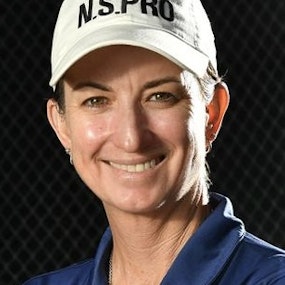
Webb, Karrie
Golf Professional
In a career marked by one accomplishment after another, Karrie Webb’s greatest achievement arguably is qualifying for the World Golf Hall of Fame by age 25. “It took me forever to get in,” said Juli Inkster. “I feel like the turtle and Karrie is the hare.”
“It’s hard to fathom,” added Beth Daniel. “When the LPGA changed the qualifying criteria [in 1999], they made it so the players who dominated their era would be recognized and Karrie’s been dominant.”
Webb succeeded without a learning curve. She was young, confident, and fearless. In 1995, at age 20, she won the Weetabix Women’s British Open before she became a member of the LPGA Tour. Her legend grew when she defied a broken wrist to earn her LPGA Tour card. Then in just her second tournament as a LPGA member, she won the HealthSouth Inaugural. “She was a name you heard about before she became a force on Tour,” said two-time U.S. Women’s Open champion Meg Mallon, “and she didn’t disappoint.”
“The beauty of golf is one day I love it, the next day I hate it. But no matter how my day goes on the course, I get up and I do it again.”
Webb grew up in the small town of Ayr in Queensland and still maintains a residence there. She started playing golf at the age of 8, and earned her first golf trophy in her first-ever golf tournament. “It was the first time I ever played 18 holes,” she remembered. “It was over two days and I shot 150 and then 135, and I won the Encouragement Award.” Little did she know that she had finished in last place. “I didn’t find that out until I got a little older.”
New to FORE the Good of the Game?
Here are some great episodes to start with. Or, check out episodes by topic.














